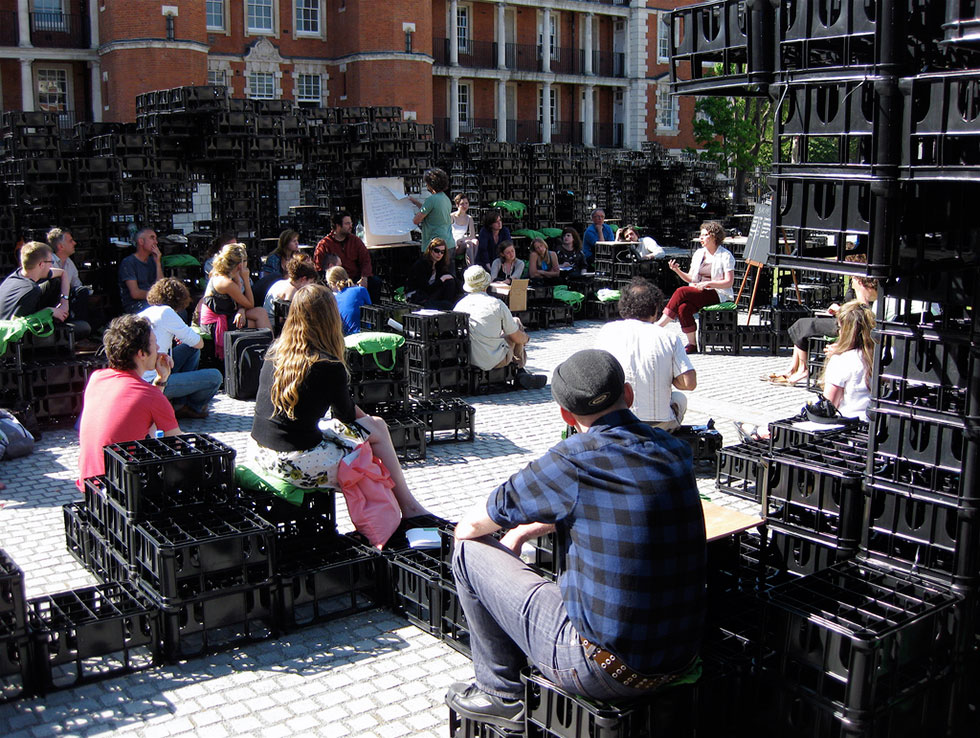Neil Cummings, Marsha Bradfield and David Cross

Context
Markets are brilliant bundles of technologies, assembled to exchange things. All kinds of things – from living labour to resources and foodstuffs as well as public services. And because markets broker our big systems like healthcare and education, they also determine our futures in ways we don’t always think about. The most visible form of the market is a competitive one. The neo- classical economic model pictures rational individuals pursuing their own self-interest – without regard for others – as the motive force for markets. The laws of supply and demand that organise these homo economicus extrude the values – often represented by a financial price – exchanged, in any transaction. These fundamental elements – rational agents, supply and demand and the ‘efficiency’ produced by price mechanisms – function in most markets, making them like natural laws.
Except of course, not all economies are markets, and even competitive markets don’t actually work like this, or at least, only in theoretical models. And yet, outside of public museums, and some secretive private collections, art, artists and their artworlds reproduce through competitive markets. Even art and design education is riven with ‘market forces’. Why have we enabled the values of competitive markets to dominate our recent evaluations of contemporary cultural production? We inhabit a mono-culture of evaluation, and this is not resilient.
Resilient values: evaluative communities
Building resilience in art and design communities will involve learning to value other kinds of values, like care and generosity. It will entail building peer-networks, and prioritising cooperation over individuation and attention seeking. We will need to overwrite scarcity with creative abundance, build a commons of creative resources, enjoy complexity and distribute decision making. We might also need to re-imagine the University as a social enterprise.
Taking our model from resilient ecosystems (where bio-diversity is essential for their reproduction), we intend to research different, varied, even conflictual evaluative communities. We start from the assumption that all values and evaluation take place through social processes that bring actors together into communities of varying scales; from intimate personal exchanges – family gifts, to terrifying international power-trade sanctions. Communities of evaluation give values their emotional, monetary or material texture, and simultaneously enable these communities to be visible. Values, especially abstract values are not qualities of things or people, but momentary judgements – value judgements – given a ‘sensible’ (meaning apprehensible) form, that can be transacted.
‘We inhabit a mono-culture of evaluation, and this is not resilient … to build resilience in art and design communities, we might need to learn to value care and generosity.’
Evaluative communities choreograph the exchange of values within any given society. These communities are scalable in number, distributed in space (near or far) and variously durational (they can be fleeting, or durable enough to aggregate institutions). As the values they produce persist, the communities themselves become more resilient. Other values are introduced and purged through feedback loops that test and stretch each community’s scope, relative to other communities in their proximity.
Examples of evaluative communities may include (and in no particular order):
- Skill sharing networks, like maker libraries, communal workshops and hacklabs
- Blood and organ donation systems (commons-like resources)
- Wikipedia, bitcoin, archive.org and Creative Commons as digital commons
- A tournament of evaluation – An art auction – (art’s value as purposive purposeless (Adorno) is useful for its circulationin competitive markets, but is it a price we can still afford?)
- Time banks, where time replaces money as a currency
- Localised currencies – such as the Brixton Pound
- Non-human values; biotic, geological, machinic
- Crowdfunding / skillsourcing and non-financial enthusiasm communities
- Microfinancing networks
- Reputational ecosystems
- Reading groups, knitting circles and other discursive cells
- Economies of attention
- Temporary and fleeting evaluative communities, such as festivals like Roskilde, Burning Man or Glastonbury
- Gift economies: various volunteer and exchange communities and their hidden obligations
- Upcycled Waste-management streams, and repurposed asset valuations
- Occupy Finance – ie Ethical investment, communal ownership of public resources, or other forms of resource management
- Imaging alternative forms of profit, loyalty and fandom
What are the values we value in peer-2-peer exchanges, or commons- like and communal creative resources? How do we recognise the social processes through which values in art and design are valorised?
‘Evaluative communities choreograph the exchange of values within any given society. These communities are scalable in number, distributed in space (near or far) and variously durational (they can be fleeting, or durable enough to aggregate institutions).’
Conflicts in expert and non-expert evaluative communities?
In an attempt to insert different values into political discourse, the New Economics Foundation designed a ‘happiness index’. In 2010 they persuaded Prime Minister David Cameron to launch a £2m plan to measure the nation’s happiness, with the Office for National Statistics collating data as people rated their own well-being and happiness. This is a double edged sword; to make happiness accountable to public policy, NEF economised happiness and gave it a price.
We are interested in exploring the complex assemblies of value that art and design can generate, and then to try and test whether these values can be resilient – values that persist after their (inevitable) competitive market expropriation. We aim to produce meshworks rather than monocultures of evaluation. We intend to assemble a new lexicon of resilient values for the 21st century, and new ‘communities of evaluation’.
We will collaborate with artists, designers, economists, academics, ecologists, anthropologists, civil-society groups, donorpreneurs, sales-persons, activists and others.
CoR members Neil Cummings and Marsha Bradfield are both members of Critical Practice, and David Cross has worked with the cluster on various projects for more than five years.